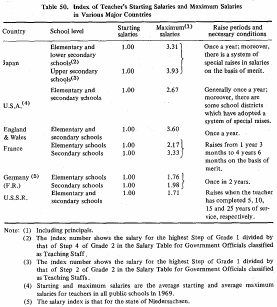| Home > Policy > White Paper, Notice, Announcement > White Paper > EDUCATIONAL STANDARDS IN JAPAN 1971 > CHAPTER |
||
In Japan there are 4 salary tables for the teaching staff members in national schools i.e., for teachers in universities and junior colleges; in technical colleges; in upper secondary schools; and in lower secondary and elementary schools, respectively. Grades and steps in the salary tables are determined on the basis of degrees of complexity, difficulty, and responsibility of teaching duties, as well as

the academic background, kinds of teaching certificates, and years of teaching experience of each teacher. For teachers in elementary, lower and upper secondary schools, the salary tables consist of 3 grades as standard classifications, i.e., for principals, for teachers, and for lecturers and assistant teachers. The salary system for teachers in national schools serves as the basis for salaries of teachers in local public schools as well.
As regards the kinds of salary tables for teachers in other major countries. France and the Federal Republic of Germany have three kinds of tables; i.e., for teachers in elementary schools, secondary schools and universities, respectively, while the United States of America, England and Wales and the U.S.S.R. have two tables, i.e., one for elementary and secondary school teachers and the other for university teachers. Each country applies salary tables to principals of elementary and secondary schools different from those for teachers. The starting salary is decided on the basis of the academic background, the teaching certificate and the teacher's qualifications. In the Federal Republic of Germany, the age of the teacher is also considered in the determination of salaries.
In Japan the period for salary raises for elementary and secondary school teachers is, in principle. Once a year so long as the teacher concerned attends to his duties diligently and is not below the number of the prescribed days of service. Further, this normal period can be shortened on the basis of merit. This is called the System of Special Raises in Salaries. In the Federal Republic of Germany the salaries for teachers are raised every two years and in the U.S.S.R. salary raises for each teacher come only four times, when the teacher concerned has completed 5,10, 15, and 25 years of service. In France, the span of years for salary raises for teachers ranked in low grades of the salary table ranges from 1 year 3 months to 1year 6 months. However, in general, the higher the grade the longer span for raises becomes. On the basis of merit, the periods for raises in the salary grades are divided into the tree, i.e., the shortest, the ordinary and the longest, each including 30%. 50% and 2O% of the teachers concerned, respectively. Compared with other countries, the increase in the salary index for teachers in elementary and secondary schools was the greatest in Japan, while the increase was the least in the U.S.S.R.
In Japan, there are also allowances such as a family allowance, an adjustment allowance, a commutation allowance, a special duties allowance, a remote duty allowance, a severe climate allowance, a managerial duty allowance, a starting salary adjustment allowance, an annual bonus, a meritorious duty allowance, a part-time or correspondence course allowance, a vocational education allowance, etc., each or which is characterized either as a living wage, an efficiency wade or a service wage.
In other major countries there are not as many kinds of allowance as in Japan. The allowances most commonly found in other major countries are a family and children allowance (the United States of America. France, the Federal Republic of Germany), a duty place allowance (England and Wales, France, the Federal Republic of Germany, the U.S.S.R.), and a managerial duty allowance (England and Wales, France, the-Federal Republic of Germany). Unique kinds of allowance include an extra-curricular activities allowance (the United States of America), ahead of department allowance (England and Wales), guidance for future career allowance (France), and a foreign language teaching allowance (the U.S.S.R.). In France and the U.S.S.R. teachers who take charge of lessons beyond the standard hours of instruction are given allowances in accordance with the services performed.
| Back to Top | MEXT HOME |